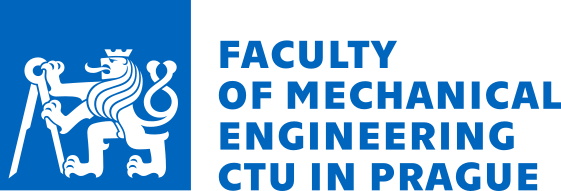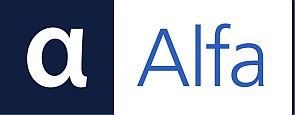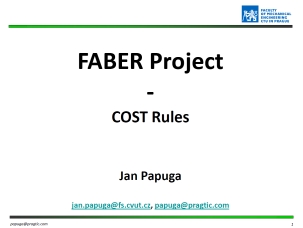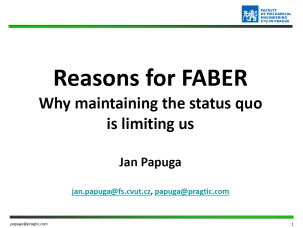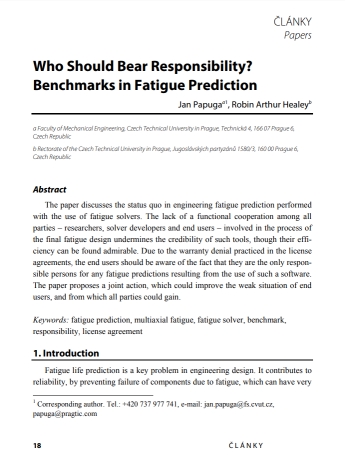User: unknown || Login || NEWS: PSD data, WCFA2024, W2TFP records, FABER funded!


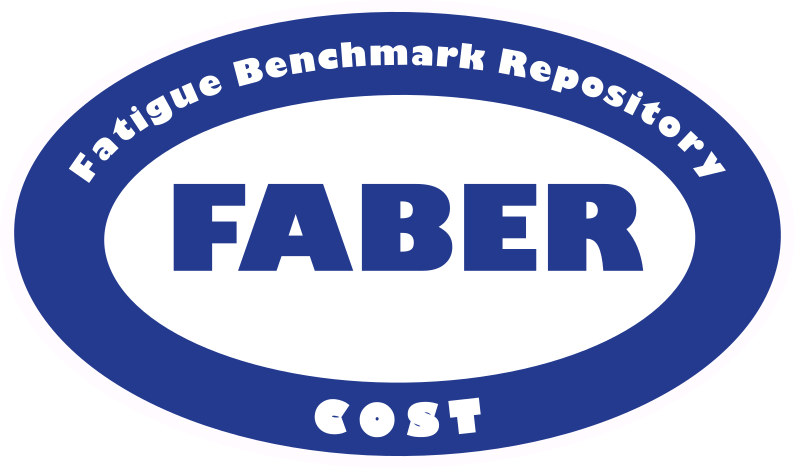
Quick access
FABER (Fatigue Benchmark Repository)
Annotation
Progress in computational fatigue analysis is hindered by siloed stakeholder research. The current landscape is riddled with fragmented data and limited cooperation. Research is gathering dust and commercial competition is stifling innovation.
The FABER Network addresses these barriers and works towards a more open-minded science in engineering and research concerning fatigue life estimation. Are you ready to rise to the challenge? Join the collaboration revolution and become a pioneer in the future of fatigue analysis!
State of the art
Metal fatigue is a major concern in engineering as it weakens metal components over time. It occurs due to repeated stresses, even if those stresses are below the metal's apparent breaking point. Predicting fatigue is difficult and such process relies on complex calculations or expensive testing. Engineers use computer models to assess fatigue risk in designs, but these models may not be entirely accurate. There's a push for better methods to estimate fatigue so that safer and cheaper designs can be made.
Fatigue solvers are software tools built to reduce design costs and time. However, the core methods used in these solvers have not significantly improved in decades, hindered by the prioritization of speed and marketability over accuracy. Developers tend to downplay the need for fatigue expertise and avoid independent evaluation of their software's effectiveness by a limiting end user license agreement. This lack of focus on improvement may well hinder advancements in fatigue estimation.
The question is, how can a user test the correctness of a fatigue solver? The FABER project proposes the creation of robust benchmarks for fatigue data to enable better fatigue estimation methods and ultimately lead to safer and more cost-effective designs.
Stakeholders
FABER concerns a challenge in the engineering field related to fatigue analysis of materials. There are three main stakeholders involved:
- Academia - Universities are supposed to research and improve methods for predicting fatigue damage in metals.However, funding cuts and a focus on new research areas have reduced efforts in verifying existing methods used in fatigue solver software.
- Industry - Companies rely on accurate fatigue analysis to ensure the safety and lifespan of their products. They use fatigue solver software for efficiency, but there is a concern about the software's accuracy.
- Fatigue Solver Developers - These companies create the software tools for fatigue analysis. They are motivated by profit and may not prioritize improvements to the core methods used in their software.
There is a lack of robust and affordable ways to verify the accuracy of fatigue solver software. This is leading to a situation where none of the stakeholders are taking full responsibility for ensuring the reliability of fatigue analysis methods.
Objectives
The overall goal of this project is to improve fatigue analysis methods by creating a central resource for data and tools.This will be achieved through several objectives:
- Building a large, reliable database of experimental fatigue data: This data will be collected, curated, and made accessible to researchers.
- Developing open-source software tools: These tools will allow researchers to easily use the fatigue data for benchmarking fatigue estimation models.
- Encouraging collaboration between researchers and industry: This will involve creating joint research groups, organizing challenges, and promoting the use of standardized practices.
- Improving the quality of fatigue solver software: By providing better benchmark data and encouraging collaboration, the project aims to make fatigue solver software more accurate and reliable.
- Standardizing data management practices: This will ensure that all data is collected, stored, and analyzed consistently.
- Building a long-term sustainable effort: The project aims to establish a system that can continue to grow and improve after the initial funding period ends.
Overall, the project aims to create a more efficient and reliable fatigue analysis process by establishing a central resource for data and tools, fostering collaboration between stakeholders, and promoting the use of standardized practices.
COST
This shortened information is related to the upcoming COST Action “Fatigue Benchmark Repository”, which is negotiated to be supported by COST (European Cooperation in Science and Technology) from November 2024 for 4 years. COST is funding agency for research and innovation networks. Its Actions help connect research initiatives across Europe and enable scientists to grow their ideas by sharing them with their peers. This boosts their research career and innovation.
COST is focused on networking support only. An extremely shortened synopsis of the rules can be found here:
Full accepted project proposal
Here is the link to the full project proposal accepted for funding by COST.
Further material
For a more extended reasoning, check this presentation:
Or start to read here on p. 20:
Do you want to join or to know more?
If you wish to join us or to study the full Memorandum of Undestanding, you can access it here.
If you want to take part in FABER, contact also Jan Papuga. It is practical to to join our mail list (note that this is a different mail list than the mail list used for the WCFA workskhops and PragTic-related activities) to get the first hand information:
FABEST
FABEST is a spin-off activity of FABER. Originally, it is intended to be a worldwide challenge to provide the best possible fatigue prediction for the provided test setup. It is expected to run twice during the FABER 4-year duration. However, as FABER had not been accepted for a long time, we decided to proceed at a quicker pace and have already started the testing activity. We managed to purchase 1.4 tons of 42CrMo4+QT steel from one heat in the form of bars with a 35 mm diameter. Since FABER will not provide any funding eligible for the experimental effort, the rules for joining FABEST are as follows:
- Each member must fund their participation themselves regarding manufacturing and experimental costs.
- We are trying to keep production at one facility to minimize differences caused by production in various workshops, but this requirement is open to further discussion.
- Within the campaign until now, we are focusing primarily on these topics within the high-cycle fatigue domain::
- Mean stress effect
- Frequency effect
- Size effect
- Roughness/Residual stress effect
- Homogeneity/Anisotropy effect
- Before these topics are finalized, other more complex topics (multiaxial loading, notches, fretting, low-cycle fatigue, random loading...) are not prioritized.
- Any member has the right to publish the test results they achieve first, and only then can other members use it in their own publications.
Feel free to contact Jan Papuga if you are interested in joining us.

















